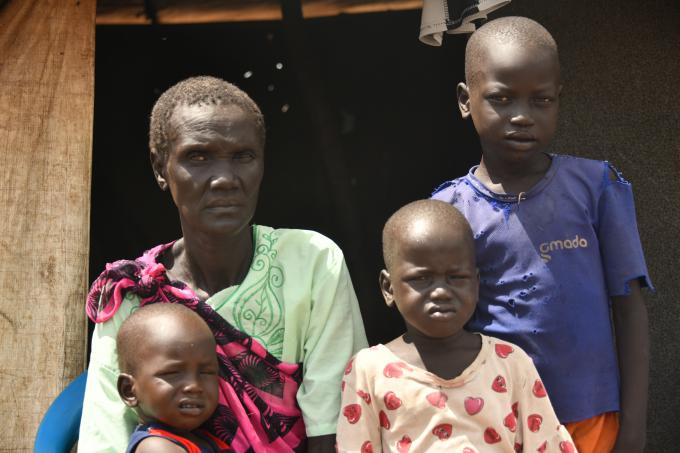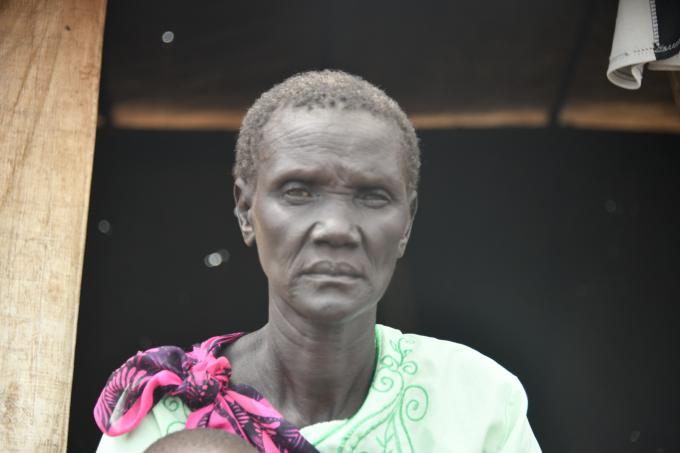IDPS in Bor Find Hope to Start a New Life After Displacement by Floods
Abut, 40, and her grandchildren at home in Bor, South Sudan IDP camp. They are among 2400 IDPs supported by Save the Children to start a new life after displacement by floods in 2020. Photo: Daniel Danis/Save the Children.
Bor, South Sudan - Abut*, 40, is the grandmother of 1-year-old Maker*, a boy who lost his mother and father at the age of one. Abut’s town Bor, has faced serious and multiple flooding and her family is at the risk of hunger in 2022. Abut’s family was displaced by floods in 2020 to Bor stadium IDPs camp, where they live now. Abut and many others in their village were farmers practicing mix-farming (growing crops and rearing animals). However, Abut lost everything as a result of the 2020 flooding.
Abut, at the age of 40, is not only taking care of Maker* but also other 3 children of her family. She is struggling for their survival. This made it difficult for her to meet all the children’s needs. Three of the children Abut is taking care of are supposed to be in school but Abut couldn’t take them to school because she cannot afford their scholastic materials and basic needs.
When Save the Children met Abut and Maker in October 2021, they were living in Bor stadium IDPs camp, 10km away from the main town. Abut could only go to the forest to collect firewood to sell and earn something for a living, but insecurity has become a threat and stopped her from going to the forest. They only have one mosquito net, no sleeping mat, blanket, and bed sheet. The family could brow from their neighbors a sleeping mat and had one blanket to use at night. Abut's situation was bad due to the poor living condition.
Abut was also worried because she couldn’t afford shelter and other basic needs like clothes, food, and education for her children. She is also worried because they have been displaced by flooding, and insecurity is a threat, as a result, she reported her living condition to Save the Children Child Protection Help Desk. She said she could not afford to buy milk for one year old Maker. This raised a flag to Save the Children to intervene.
How did Save the Children support Abut’s family?
Save the children supported Abut’s family with plastic sheets, milk, blankets, bed sheets, sleeping mats, mosquito nets, and bathing soaps. Save the Children also supported the enrollment of the children to primary school and facilitated them for referral to WFP to get food ratio card. Abut’s family is now receiving food ratio. They sleep under mosquito nets to prevent malaria. Her children received scholastic materials to go to school and Save the children is providing psychosocial support and positive parenting without violence training to Abut to be better and support her children's wellbeing.
Story in Abut’s own words
“I am unable to make my houses as an old and jobless woman. I have no son who will assist me to support in raising the kids in any way. I have been displaced by flooding in Mathiang and all our animals have died. I am now receiving food ratio from WFP to support my family due to referral made by Save the Children. I am able to take good care of my children and their wellbeing due to skill I acquired from Save the Children training on Positive Parenting without violence. My children are now attending classes daily because Save the Children intervened in the IDPs camp”
About the Project
The Child protection concerns and interventions of humanitarians in Bor are driven by intercommunal and armed conflicts. The flag of protection concerns was and is being raised by flooding, food insecurity, economic crisis, effects of COVID-19, and limited access to basic services. Save the Children's project with support from the South Sudan Humanitarian Fund (SSHF) in Bor is intended to support vulnerable affected populations in five IDPs camps in Bor through the establishment and strengthening of Child Protection systems, individual support through case management services and mental health and psychosocial support (MHPSS), awareness-raising, capacity building and monitoring and reporting. The project directly benefits 2400 programme recipients in the Bor South and 2000 indirect beneficiaries among host communities and from other IDP camps mainly through non-focused MHPSS, case management, Child Protection system strengthening community-based approaches such as awareness raising on key child protection concerns in the community, child protection prevention messaging and child help desks.
Story written by: Deng Akhau Wel/Save the Children
Story edited by: Tito Justin/Save the Children
 South Sudan
South Sudan 
